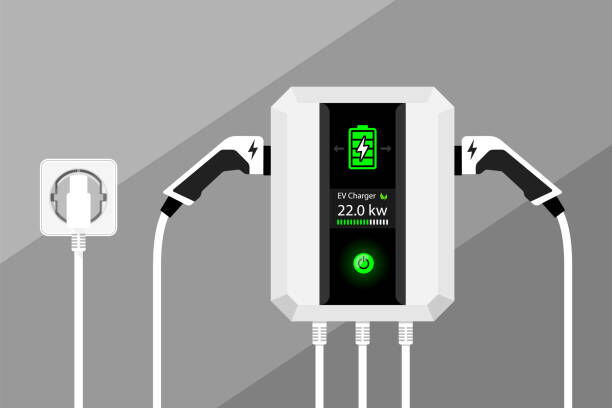As electric vehicles (EVs) continue to grow in popularity, the demand for convenient and efficient charging solutions is on the rise. One of the best ways to ensure that your electric vehicle is always ready to go is by installing a home AC EV charger. This article will explore the key considerations when choosing the best EV charger for your home and the numerous advantages of having one installed.

When selecting an EV charger for your home, it’s important to consider several factors to ensure that you choose the right solution for your needs. Here are the key considerations:
EV chargers come with different power ratings, typically ranging from 3.5kW to 22kW for home use. A higher power rating means faster charging times, but it also requires a more robust electrical system. Assess your vehicle's charging capacity and your daily driving habits to determine the appropriate charging speed.
Ensure that the charger you choose is compatible with your EV. Most modern EVs use a Type 2 connector for AC charging, but it's essential to confirm that the charger matches your vehicle’s requirements. Some chargers are also compatible with multiple vehicle models, which is ideal if you have more than one EV or plan to upgrade in the future.
The installation process for a home EV charger can vary depending on your existing electrical setup. Some chargers require a dedicated circuit or electrical panel upgrade. It’s advisable to consult with a licensed electrician to assess the installation needs and ensure compliance with local regulations.
Many modern EV chargers come with smart features that allow you to monitor and control charging through a mobile app. These features can include scheduling, energy usage tracking, and integration with solar panels or smart home systems. Consider whether these capabilities are important to you when selecting a charger.
The cost of purchasing and installing a home EV charger can vary widely. However, there are often government incentives or rebates available to offset some of the expenses. Research any available financial assistance and factor it into your decision-making process.
If you plan to install the charger outdoors, it's crucial to choose a unit that is weather-resistant and durable. Look for chargers with a high IP rating, which indicates protection against dust and water.
Installing an EV charger at home offers numerous benefits, making it a worthwhile investment for any electric vehicle owner. Here are some of the key advantages:
One of the most significant benefits of having a home EV charger is the convenience it offers. With a charger at home, you can charge your vehicle overnight while you sleep, ensuring that you start each day with a fully charged battery. This eliminates the need for frequent trips to public charging stations and allows you to maintain your vehicle’s charge level effortlessly.
Charging your EV at home is typically more cost-effective than using public charging stations. Many utility companies offer lower electricity rates during off-peak hours, which can result in substantial savings if you schedule your charging for these times. Additionally, having a home charger allows you to avoid the higher per-kilowatt-hour fees often associated with public chargers.
Installing a home EV charger can enhance the value of your property. As the adoption of electric vehicles continues to rise, homebuyers are increasingly looking for properties with EV charging capabilities. Having a charger already installed can make your home more attractive to potential buyers, especially those who are environmentally conscious or own an electric vehicle.
Charging your EV at home can contribute to reducing your carbon footprint, especially if your home is powered by renewable energy sources such as solar panels. By generating and using clean energy for your vehicle, you can further minimize your impact on the environment and promote sustainable living.
For homeowners with solar panels, installing a home EV charger offers the opportunity to charge your vehicle using the energy generated by your own home. This not only reduces your reliance on the grid but also allows you to take full advantage of the renewable energy you produce, increasing your energy independence and reducing long-term costs.
With a home EV charger, you have full control over when and how your vehicle charges. Many chargers come with customizable settings, allowing you to schedule charging times, set power levels, and monitor energy consumption. This level of control can help you optimize your charging routine and ensure that your vehicle is always ready when you need it.
Regularly charging your EV at home, especially at a slower rate with an AC charger, can help reduce the wear and tear on your vehicle’s battery. Fast charging at public stations, while convenient in some situations, can generate more heat and stress on the battery, potentially shortening its lifespan. Home charging allows for a gentler, more consistent charging process, which can help prolong the life of your EV’s battery.
Charging your vehicle at home provides an added layer of security. Public charging stations, while generally safe, can be subject to theft or vandalism. By charging at home, you reduce the risk of these issues and can ensure that your vehicle is safely stored while it charges.
Investing in a home AC EV charger offers numerous benefits, from the convenience of overnight charging to cost savings and increased property value. By carefully considering factors such as charging speed, compatibility, and installation requirements, you can select the best charger for your home and enjoy the many advantages it provides. As the world continues to shift towards sustainable transportation, having a home EV charger is not only a smart investment but also a step towards a greener, more efficient future. Whether you're a new EV owner or looking to upgrade your charging setup, a home AC EV charger can significantly enhance your electric vehicle experience.